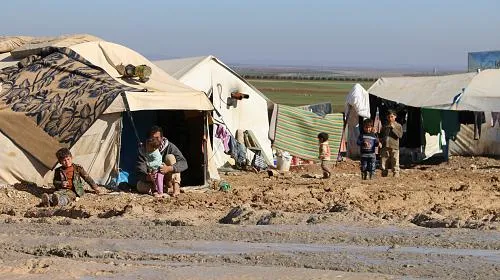Syrians tell about life with little food, water, and medicine and call for an immediate ceasefire
IDLIB (Feb 8, 2018)—Syrian civilians in Idlib and Eastern Ghouta have described to CARE increasingly harsh living conditions, pushing them to resort to fodder, expired medicine and unsafe water, as fighting continues in these two areas that are part of the ‘de-escalation zones.’ They called for the urgent delivery of aid, and an immediate end to the targeting of civilians.
“Our teams are witnessing previously unseen situations: people with nothing but a layer of clothes, displaced by the airstrikes, and seeking refuge in open fields, some trying to shelter from the harsh weather under olive trees,” said Maryam* who works in Idlib for a local aid organization supported by CARE.
The team was assessing the needs of up to 300 families, displaced from Saraqeb town, which has been hit by several airstrikes that have caused dozens of deaths and injuries, and pushed 17,000 people to flee for safety. Civilians from the northwestern Syrian city were gathered in a field, sitting on bare ground, some of them having built flimsy tents with a few blankets they had taken with them in their flight. “Every day, newly displaced people arrive. Some of them had been displaced previously and have nothing left,” said Maryam.
In another site, where another organization has been setting up tents, families displaced from Hama are living with minimal aid, trying to burn the little firewood they can gather to cook and keep warm. They have no toilets or proper sanitation, and rely on unsafe water trucked from nearby towns. With more than 1,200 schools closed in many areas of the governorate for fear of airstrikes, children remain at home.
Manal*, a teacher working for a Syrian organization, mentioned several cases of depression in children she supports. More than 200,000 people have been displaced in Idlib since December 2017, which alone saw a reported 16 attacks against healthcare facilities.
“Aid organizations like CARE are stepping up their assistance where possible, but the rate at which displacement is happening makes it impossible for humanitarian agencies to cover the needs of all people,” said Wouter Schaap, CARE’s country director for Syria. “The targeting of densely populated areas and civilian infrastructure has to stop now, and lifesaving aid has to reach men, women and children urgently.”
In Eastern Ghouta, other humanitarian workers described lack of healthcare and food, leading people to use expired medicine, including antibiotics, and fodder to make bread, as the price of wheat flour soars. The area, home to nearly 400,000 people who have been besieged since 2012 by government forces, has recently seen a surge in deadly airstrikes, and a tightening of the siege. Schools have been closed for six weeks now.
“Everything in Ghouta is 8 or 10 times more expensive than Damascus. We have no electricity so have to cook what is available day by day, because we can’t store food in fridges. And if we have some firewood, we use it in one room where we all huddle up’, said Zeina*, an aid worker with a Syrian organization.
Two pounds of sugar sells for $4, meat for $9 and bread for more than $3.80, while the average monthly salary of a teacher is just $97. As the siege tightens, smuggled goods have become pricier, and families are having to resort to extremes to keep food on the table, such as mixing fodder with corn flour or barley to make bread. Some have reduced their meals to just one per day.
Since the end of December, no medical evacuations from Eastern Ghouta have taken place. According to the United Nations (UN), 24 civilians have died while waiting for medical evacuation in January. In December and January, no besieged area has received aid delivery through UN convoys.
CARE and the partners it supports inside Syria echo the UN call for a month-long ceasefire, to allow humanitarian agencies to deliver critical aid to hundreds of thousands of people and evacuate the urgent medical cases. “If the airstrikes, bombings and clashes continue or intensify, we will be like firefighters running to extinguish the flames in one spot, while two, three, four others burn up,” said Schaap.
Notes to editors:
- All Syrian civil society organizations mentioned in this press release are supported by CARE, and were interviewed between the end of January and the first week of February. *Names have been changed for safety reasons.
- Russia, Iran and Turkey announced in 2017 the creation of four ‘de-escalation zones’ that include ‘Eastern Ghouta, certain parts in the north of Homs province, in Idlib province and certain parts of the neighboring provinces (Latakia, Hama and Aleppo provinces) and also in certain parts of southern Syria.’
- Senior United Nations officials in Syria warned on Tuesday of the dire humanitarian crisis in several parts of the country, calling on warring parties to immediately stop fighting so aid and basic services can reach those in need, and the sick and critically wounded can evacuate.
- Six international organizations, including CARE International, have warned in a new report Dangerous Ground: Syria’s refugees face an uncertain future against the early returns of Syrian refugees into the country while the conflict is ongoing and civilians’ safety is not guaranteed.
About CARE:
Founded in 1945, CARE is a leading humanitarian organization fighting global poverty. CARE has more than seven decades of experience helping people prepare for disasters, providing lifesaving assistance when a crisis hits, and helping communities recover after the emergency has passed. CARE places special focus on women and children who are often disproportionately affected by disasters. Last year, CARE worked in 94 countries to reach 80 million people, including more than 11 million through emergency response and humanitarian aid. Learn more at www.care.org
Media Contact:
Nicole Harris, nharris@care.org, 404-735-0871

